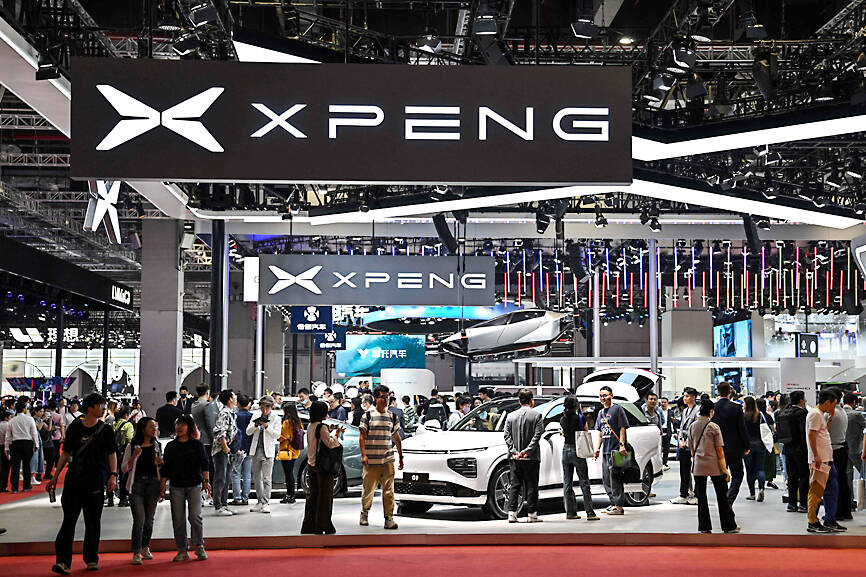Chinese electric vehicle (EV) giant XPeng Inc (小鵬) yesterday said that it would buy the EV subsidiary of ride-hailing platform Didi Global Inc (滴滴) for HK$5.84 billion (US$744.4 million).
The all-stock deal would see Didi emerge with a 3.25 percent stake in the company, XPeng said in a filing to the Hong Kong stock exchange.
Xpeng said it would also partner with Didi to launch a new EV brand next year.

Photo: AFP
Dubbed Project “MONA,” the vehicles would target the mass market segment with a price tag of about 150,000 yuan (US$20,566), it said.
Markets welcomed the deal, which enables the Chinese manufacturer to eliminate a potential competitor and gain access to its advanced technology. XPeng shares gained 10.9 percent yesterday. The brand — which also markets some of its products in Europe — employs about 14,400 people and has offices in Silicon Valley, California and Amsterdam.
XPeng sold 41,435 vehicles in the first half of this year, down 40 percent year-on-year, results published this month showed.
The partnership with Didi comes just more than a month after Xpeng received a US$700 million investment from German auto giant Volkswagen AG to jointly develop EVs for the Chinese market, and should help ease investor concerns about sluggish sales in the face of intensifying competition from the likes of Nio Inc (蔚來), BYD Co (比亞迪) and Tesla Inc.
Separately, the electronics arm of BYD agreed to buy Jabil Inc’s manufacturing business in China for 15.8 billion yuan, expanding its production base in the world’s largest mobile arena.
BYD Electronic International Co (比亞迪電子) is taking over the US company’s product manufacturing business in Chengdu and Wuxi, China, it said in a statement.
The pact includes the manufacturing of products for existing customers.
Additional reporting by Bloomberg

Real estate agent and property developer JSL Construction & Development Co (愛山林) led the average compensation rankings among companies listed on the Taiwan Stock Exchange (TWSE) last year, while contract chipmaker Taiwan Semiconductor Manufacturing Co (TSMC, 台積電) finished 14th. JSL Construction paid its employees total average compensation of NT$4.78 million (US$159,701), down 13.5 percent from a year earlier, but still ahead of the most profitable listed tech giants, including TSMC, TWSE data showed. Last year, the average compensation (which includes salary, overtime, bonuses and allowances) paid by TSMC rose 21.6 percent to reach about NT$3.33 million, lifting its ranking by 10 notches

Popular vape brands such as Geek Bar might get more expensive in the US — if you can find them at all. Shipments of vapes from China to the US ground to a near halt last month from a year ago, official data showed, hit by US President Donald Trump’s tariffs and a crackdown on unauthorized e-cigarettes in the world’s biggest market for smoking alternatives. That includes Geek Bar, a brand of flavored vapes that is not authorized to sell in the US, but which had been widely available due to porous import controls. One retailer, who asked not to be named, because

SEASONAL WEAKNESS: The combined revenue of the top 10 foundries fell 5.4%, but rush orders and China’s subsidies partially offset slowing demand Taiwan Semiconductor Manufacturing Co (TSMC, 台積電) further solidified its dominance in the global wafer foundry business in the first quarter of this year, remaining far ahead of its closest rival, Samsung Electronics Co, TrendForce Corp (集邦科技) said yesterday. TSMC posted US$25.52 billion in sales in the January-to-March period, down 5 percent from the previous quarter, but its market share rose from 67.1 percent the previous quarter to 67.6 percent, TrendForce said in a report. While smartphone-related wafer shipments declined in the first quarter due to seasonal factors, solid demand for artificial intelligence (AI) and high-performance computing (HPC) devices and urgent TV-related orders

Prices of gasoline and diesel products at domestic fuel stations are this week to rise NT$0.2 and NT$0.3 per liter respectively, after international crude oil prices increased last week, CPC Corp, Taiwan (台灣中油) and Formosa Petrochemical Corp (台塑石化) said yesterday. International crude oil prices last week snapped a two-week losing streak as the geopolitical situation between Russia and Ukraine turned increasingly tense, CPC said in a statement. News that some oil production facilities in Alberta, Canada, were shut down due to wildfires and that US-Iran nuclear talks made no progress also helped push oil prices to a significant weekly gain, Formosa said